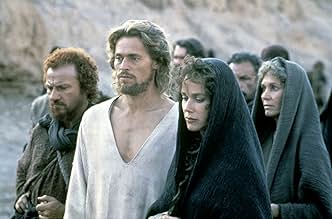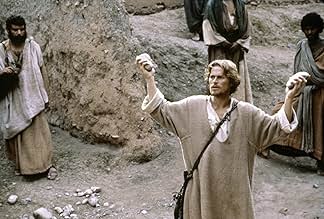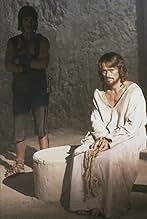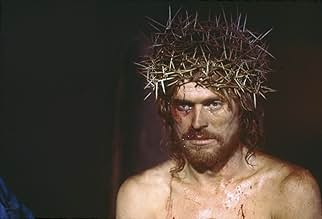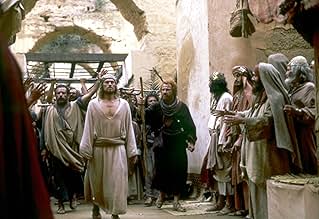La vita di Gesù Cristo, il suo viaggio attraverso la vita mentre affronta le lotte che fanno tutti gli umani e la sua ultima tentazione sulla croce.La vita di Gesù Cristo, il suo viaggio attraverso la vita mentre affronta le lotte che fanno tutti gli umani e la sua ultima tentazione sulla croce.La vita di Gesù Cristo, il suo viaggio attraverso la vita mentre affronta le lotte che fanno tutti gli umani e la sua ultima tentazione sulla croce.
- Regia
- Sceneggiatura
- Star
- Candidato a 1 Oscar
- 2 vittorie e 7 candidature totali
Steve Shill
- Centurian
- (as Steven Shill)
Recensioni in evidenza
Has there ever been a more misunderstood film than Martin Scorcese's The Last Temptation Of Christ? Released amid great controversy and accused of being an offensive and unholy film, the truth of the matter is that it is a deeply reverent work which has the courage to ask challenging questions about the pressures and doubts Jesus must have experienced as the appointed Messiah. It also shows the violence of the times in graphic detail. If viewers consider it blasphemous to explore on film the immense burden of duty that Jesus bore through his life, then they are narrow-minded and ignorant. If people feel that to show the brutality and harshness of life in Roman times is tasteless and inappropriate, then they are guilty of glorifying difficult but factual truths. There is NOTHING offensive about this film. There is, however, much that is challenging.
Jesus (Willem Dafoe), an honest carpenter, saves Mary Magdalene (Barbara Hershey) from a stoning. Already dimly aware that he is destined to lead an extraordinary life, he soon finds himself being drawn into the role of a religious figurehead. But Jesus finds it hard to accept that he is a Messiah, and as his reputation and following grows he constantly questions if he is a strong enough man to handle the burden of being God's son. After isolating himself in the desert, where he experiences several hallucinations in which he is confronted by visual manifestations of good and evil, Jesus finally concludes that he IS the true son of God and whole-heartedly sets about imparting his love and wisdom to all who'll listen. Later betrayed to the disgruntled Romans by his friend Judas Iscariot (Harvey Keitel), Jesus is crucified. While on the cross, he imagines what his life would have turned out like if he had shied away from his duty as the Messiah and lived life like a mere mortal.
It is this final section of the film that has provoked the most vociferous outrage. The sequence shows Jesus as he slowly dies on the cross, dreaming of an alternative life in which he sins and copulates and hates like all normal people. Many people have criticised the film on the grounds that these scenes are blasphemous. Such claims are nonsense - the film is not saying that Jesus was a sinner, nor that he gave in to temptation of the flesh, nor still that he was a man filled with hate. The film is merely saying that, in such great pain and so close to death while still just a young man, he might - just maybe - have wondered if it was all worth it. At the end of the film, we see Jesus accept his role knowing that his death is the ultimate act of unselfish love, so the film actually is totally in agreement with what all Christians believe. If the film had come to the conclusion that Jesus's whole life was a waste, his death too, then maybe the detractors would've had cause to complain. But how can they possibly be offended by the film as it stands? For goodness sake, it's a film about absolute faith!!! In truth, The Last Temptation Of Christ is an excellent movie. Compellingly acted, beautifully shot on Moroccan locations, and full of telling ideas, it is a work of real depth and power. The accents are sometimes distracting and some of the dialogue occasionally betrays ill-suited modernisms, but apart from these minor drawbacks it is one of the most important and thought-provoking films ever made.
Jesus (Willem Dafoe), an honest carpenter, saves Mary Magdalene (Barbara Hershey) from a stoning. Already dimly aware that he is destined to lead an extraordinary life, he soon finds himself being drawn into the role of a religious figurehead. But Jesus finds it hard to accept that he is a Messiah, and as his reputation and following grows he constantly questions if he is a strong enough man to handle the burden of being God's son. After isolating himself in the desert, where he experiences several hallucinations in which he is confronted by visual manifestations of good and evil, Jesus finally concludes that he IS the true son of God and whole-heartedly sets about imparting his love and wisdom to all who'll listen. Later betrayed to the disgruntled Romans by his friend Judas Iscariot (Harvey Keitel), Jesus is crucified. While on the cross, he imagines what his life would have turned out like if he had shied away from his duty as the Messiah and lived life like a mere mortal.
It is this final section of the film that has provoked the most vociferous outrage. The sequence shows Jesus as he slowly dies on the cross, dreaming of an alternative life in which he sins and copulates and hates like all normal people. Many people have criticised the film on the grounds that these scenes are blasphemous. Such claims are nonsense - the film is not saying that Jesus was a sinner, nor that he gave in to temptation of the flesh, nor still that he was a man filled with hate. The film is merely saying that, in such great pain and so close to death while still just a young man, he might - just maybe - have wondered if it was all worth it. At the end of the film, we see Jesus accept his role knowing that his death is the ultimate act of unselfish love, so the film actually is totally in agreement with what all Christians believe. If the film had come to the conclusion that Jesus's whole life was a waste, his death too, then maybe the detractors would've had cause to complain. But how can they possibly be offended by the film as it stands? For goodness sake, it's a film about absolute faith!!! In truth, The Last Temptation Of Christ is an excellent movie. Compellingly acted, beautifully shot on Moroccan locations, and full of telling ideas, it is a work of real depth and power. The accents are sometimes distracting and some of the dialogue occasionally betrays ill-suited modernisms, but apart from these minor drawbacks it is one of the most important and thought-provoking films ever made.
Jesus was declared both fully Human as well as Divine at the Council of Chalcedon. So it makes perfect sense that he would not only suffer physically but mentally as well. Why are so many outraged by this depiction rooted in their very own beliefs? Unless of course they never knew what they were in the first place...
Despite what its critics say (most of whom haven't even seen the movie), "The Last Temptation of Christ" is one of the most deeply religious movies I have ever seen. What makes it so powerful is that it does not portray Jesus as an all-righteous, preachy figure; it portrays Him as a man. He was the son of God, but more importantly He was human. He could hurt, love, feel pain and joy, and He could make mistakes just like any of us. He had to overcome temptation. Martin Scorsese, for whom this was a long labor of love, directs a beautiful movie with all around excellent performances, particularly Harvey Keitel as Judas and Willem Defoe as Jesus. The "Last Temptation" segment which draws most of the movie's criticism, is the most important part of all because it shows how close God truly is to us, if only those critics would watch the movie before judging it, they might realize that.
This adaptation of Nikos Kazantzakis's novel, directed by Martin Scorsese, caused quite a stir on its initial release, accused of blasphemy and of causing offence to the Christian religion.
However, in its depiction of Jesus Christ as a human being rather than a man divine, it gets to the core of his story. This is a man who makes the choice of self-sacrifice for the good of his fellow men, despite the temptations of an alternative life - shown in this film by a life with Mary Magdelene rather than dying at the Crucifixion.
Played by Willem Dafoe with great sensitivity, this Christ performs miracles and discusses the intricacies of life and death with his disciples. Harvey Keitel is Judas, a rough man who fails to understand the significance of being the chosen Son of God; while Barbara Hershey is an effective Magdelene. David Bowie makes a short appearance as Pontius Pilate and is surprisingly good.
'The Last Temptation of Christ' is not one of Scorsese's best films but it certainly sparks questions and leaves food for thought. Some of the imagery is superb and the script is coherent and of a high standard.
However, in its depiction of Jesus Christ as a human being rather than a man divine, it gets to the core of his story. This is a man who makes the choice of self-sacrifice for the good of his fellow men, despite the temptations of an alternative life - shown in this film by a life with Mary Magdelene rather than dying at the Crucifixion.
Played by Willem Dafoe with great sensitivity, this Christ performs miracles and discusses the intricacies of life and death with his disciples. Harvey Keitel is Judas, a rough man who fails to understand the significance of being the chosen Son of God; while Barbara Hershey is an effective Magdelene. David Bowie makes a short appearance as Pontius Pilate and is surprisingly good.
'The Last Temptation of Christ' is not one of Scorsese's best films but it certainly sparks questions and leaves food for thought. Some of the imagery is superb and the script is coherent and of a high standard.
10CSM126-1
Condemned by Fundamentalists upon release, delayed by outcries from hypocrites and liars, and boycotted in any city where it played "The Last Temptation of Christ" is one of the most controversial movies ever made. Instead of showing Christ as a fearless and perfect person, "The Last Temptation" depicts Him as a person who fought his destiny and wished to be just another mortal human being. Religious groups who couldn't (and still can't) accept the fact that Jesus was human were shocked by such ideas and refused to see the film or read the landmark novel on which it was based. They'll never know that they attacked one of the most honest and loving depictions of Christ.
The Christ we see in the film is not based on the teachings of the Gospels, or any scripture for that matter. Instead we get a portrait of Christ the man, not Christ the Savior. We get to see his faults, his fears and anxieties. Then, we get to see him overcome those and find the strength to fulfill his destiny. The Last Temptation of Christ is not afraid to say that Jesus was weak before he became the Savior, and that makes the film all the more satisfying. This is a tale of redemption, courage, and love like no other.
There is no reason to miss this film. Not everyone will like it, but at the very least it will let you see another perspective of the story. And even if you can't accept the story, you won't be able to deny the greatness of Scorsese's direction. From the epic crowd scenes, to the intimate one-on-one conversations, to the stunning final shot (which was actually caused by an overexposed section of film, but is beautiful nonetheless), you will be awed by Scorsese's work here.
Also stunning is the work of the two leads. Willem Dafoe inhabits the role of Christ perfectly, bringing perfectly controlled emotion to each and every scene. Harvey Keitel as Judas has been the subject of debate because of his NYC accent. That was on purpose (Scorsese used accents to denote the descent of characters. American accent = Israelite; British accent = Roman), but it doesn't even matter. Keitel is brilliant no matter what his accent is.
Honest, human, loving, and unafraid, "The Last Temptation of Christ" is one of the great cinematic achievements of all time. Martin Scorsese crafted with this film his most personal masterpiece, and perhaps his greatest masterpiece ever.
The Christ we see in the film is not based on the teachings of the Gospels, or any scripture for that matter. Instead we get a portrait of Christ the man, not Christ the Savior. We get to see his faults, his fears and anxieties. Then, we get to see him overcome those and find the strength to fulfill his destiny. The Last Temptation of Christ is not afraid to say that Jesus was weak before he became the Savior, and that makes the film all the more satisfying. This is a tale of redemption, courage, and love like no other.
There is no reason to miss this film. Not everyone will like it, but at the very least it will let you see another perspective of the story. And even if you can't accept the story, you won't be able to deny the greatness of Scorsese's direction. From the epic crowd scenes, to the intimate one-on-one conversations, to the stunning final shot (which was actually caused by an overexposed section of film, but is beautiful nonetheless), you will be awed by Scorsese's work here.
Also stunning is the work of the two leads. Willem Dafoe inhabits the role of Christ perfectly, bringing perfectly controlled emotion to each and every scene. Harvey Keitel as Judas has been the subject of debate because of his NYC accent. That was on purpose (Scorsese used accents to denote the descent of characters. American accent = Israelite; British accent = Roman), but it doesn't even matter. Keitel is brilliant no matter what his accent is.
Honest, human, loving, and unafraid, "The Last Temptation of Christ" is one of the great cinematic achievements of all time. Martin Scorsese crafted with this film his most personal masterpiece, and perhaps his greatest masterpiece ever.
What Scorsese Film Ranks Highest on IMDb?
What Scorsese Film Ranks Highest on IMDb?
Cinema legend Martin Scorsese has directed some of the most acclaimed films of all time. See how IMDb users rank all of his feature films as director.
Lo sapevi?
- QuizWillem Dafoe could not see for three days, because he got too many eye drops to dilate the pupils of his eyes in bright sunlight to achieve a superhuman effect.
- BlooperWhen the first man is being crucified, as he yells when the soldier nails his hand, we can see a lot of metal fillings in his upper teeth.
- Curiosità sui crediti"This film is not based upon the Gospels but on this fictional exploration of the eternal spiritual conflict."
- Versioni alternativeMost DVD and streaming versions are missing Judas's line, "It's Magdalene; she deserves it," right before the attempted stoning scene. The line can be heard on the Criterion Blu-ray.
I più visti
Accedi per valutare e creare un elenco di titoli salvati per ottenere consigli personalizzati
Dettagli
- Data di uscita
- Paesi di origine
- Lingua
- Celebre anche come
- La última tentación de Cristo
- Luoghi delle riprese
- Moulay Ismael Stables, Villa Imperiale, Meknès, Marocco(Pontius Pilate's palace - Passover baths - interiors: the Temple)
- Aziende produttrici
- Vedi altri crediti dell’azienda su IMDbPro
Botteghino
- Budget
- 7.000.000 USD (previsto)
- Lordo Stati Uniti e Canada
- 8.373.585 USD
- Fine settimana di apertura Stati Uniti e Canada
- 401.211 USD
- 14 ago 1988
- Lordo in tutto il mondo
- 8.866.379 USD
- Tempo di esecuzione2 ore 44 minuti
- Colore
- Proporzioni
- 1.85 : 1
Contribuisci a questa pagina
Suggerisci una modifica o aggiungi i contenuti mancanti

Divario superiore
What is the Hindi language plot outline for L'ultima tentazione di Cristo (1988)?
Rispondi

